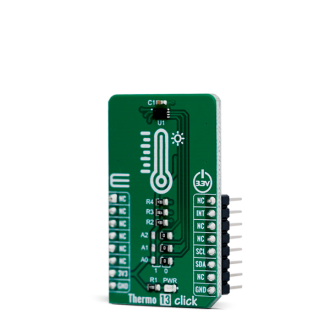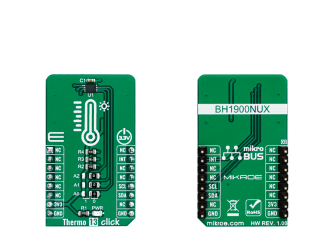
We strongly encourage users to use Package manager for sharing their code on Libstock website, because it boosts your efficiency and leaves the end user with no room for error. [more info]

Rating:
Author: MIKROE
Last Updated: 2019-08-08
Package Version: 1.0.0.0
mikroSDK Library: 1.0.0.0
Category: Temperature & humidity
Downloaded: 5069 times
Not followed.
License: MIT license
Thermo 13 Click is a Click board equipped with the sensor IC, which can digitize temperature measurements between -30°C and +95°C so that the temperature measurement data can be processed by the host MCU.
Do you want to subscribe in order to receive notifications regarding "Thermo 13 click" changes.
Do you want to unsubscribe in order to stop receiving notifications regarding "Thermo 13 click" changes.
Do you want to report abuse regarding "Thermo 13 click".


Library Description
The library initializes and defines the I2C bus driver and drivers that offer a choice for read data form register. The library includes function for read Temperature data and function for read and set temperature limit low/high register. The user also has the function for configuration chip and read Interrupt (INT pin) state.
Key functions:
float thermo13_getAmbientTemperatureData(uint8_t tempIn) - Ambient temperature datavoid thermo13_setTempLimit(uint8_t tempReg, float temp) - Set temperature limit registervoid thermo13_configuration(uint8_t cfgData) - Configuration registerExamples description
void applicationTask()
{
float Temperature;
Temperature = thermo13_getAmbientTemperatureData( _THERMO13_TEMP_IN_CELSIUS );
FloatToStr(Temperature, demoText);
mikrobus_logWrite("** Temperature : ", _LOG_TEXT);
mikrobus_logWrite(demoText, _LOG_LINE);
mikrobus_logWrite( " ---------------------------- ", _LOG_LINE);
Delay_ms( 1500 );
}
Other mikroE Libraries used in the example:
Additional notes and informations
Depending on the development board you are using, you may need USB UART click, USB UART 2 click or RS232 click to connect to your PC, for development systems with no UART to USB interface available on the board. The terminal available in all MikroElektronika compilers, or any other terminal application of your choice, can be used to read the message.